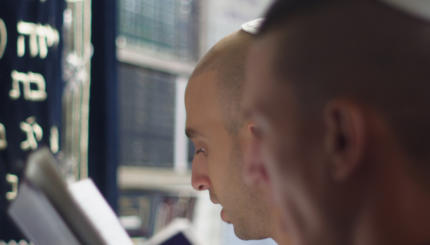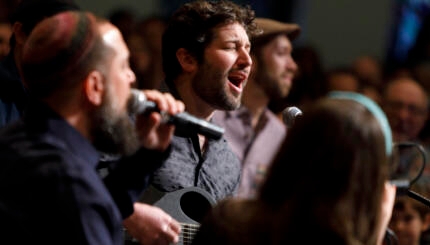Min Ha-meitzar karati Yah, Anani b’merchav Yah
“From a narrow place I called out to YAH; God answered me within the expanse.”
Traditionally, Psalm 118 is chanted as part of Hallel, a series of psalms recited on Jewish celebratory holy days. It is typically joyous, chanted from a place of freedom, from the headspace of having passed through the tough times. It suggests that we were enslaved and now we are free.
But it’s not uncommon for this verse to also find its way into prayer when we are still in crisis — the moments that cry out for answers, for finding our way out to the other side. This verse is a vision of how we long to feel and how we long to be seen.
Ha-meitzar literally means the constricted space, a narrow blind spot, our own personal Mitzrayim (the Hebrew word for Egypt). Mitzrayim is enslavement, darkness, hopelessness. When you are down and out, you aren’t just in the meitzar, you become it.

Help us keep Jewish knowledge accessible to millions of people around the world.
Your donation to My Jewish Learning fuels endless journeys of Jewish discovery. With your help, My Jewish Learning can continue to provide nonstop opportunities for learning, connection and growth.
Notice what happens in your body when you are stressed: tightness in the chest, tense shoulders, altered breath, temperature change, the toxic loop of negative thoughts. The meitzar becomes an all encompassing grip on our sanity.
No one wants to be in the meitzar. And God doesn’t want us there either. As the psalmist suggests, God has already heard our cries. And his answer, the antidote to our constriction, is space.
God is known by many names: Rock, Redeemer, Protector, Judge, Parent, the Ineffable One. In this prayer, God is called by the name Yah. Yah is different than the Tetragramaton or Eloheem. Yah is not Protector nor Redeemer. Yah is neither Judge, Father, nor Rock. Yah goes right to the source — our deep soul connection.
Take a deep breath, exhale, and say it: Yaaaah. That’s how you really say it. Yah is the breath of life. It is an answer to our prayers. Maybe not “the” answer, but a key to navigating whatever personal crisis presents itself.
Yah directs us to get quiet. Conscious, mindful breath creates the opening for us to step into our soul-expanse. When we begin to focus on the breath, to slow it down, to welcome the discomfort instead of pushing it away, the grip on our body loosens and our thoughts become clearer.
From a place of calm, we are invited to take a step into a wide open space — merchav Yah. We are invited to pause and take it in. From the merchav, we can make a conscious choice from the full range of possibilities that lay ahead. We can see for miles.
The open space doesn’t profess to solve our problems. It doesn’t erase the root cause of our trouble. But it does provide us with the foundation to master our next step. It creates a safe-haven moment in which to reflect and prepare our way forward.
In times of crisis, the psalmist reminds us that we can and should cry out to God. There is a place for wailing and gathering with others. But we must also allow ourselves to get quiet to hear an answer.
Rabbi Danielle Upbin teaches widely on Jewish spirituality, meditation and yoga. She is also the associate rabbi and prayer leader at Congregation Beth Shalom in Clearwater, Florida. Her musical release, “Reveal the Light,” is available on Amazon, iTunes, and Spotify or through her website, danielleupbin.com.



